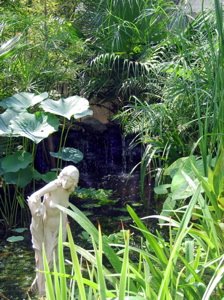
For a garden pond to be successful, it must contain both plants and fish. Not only is this an optimum esthetic condition; but a balanced biotope with interactions between plants and fish will ensure proper water conditions, reduce insects, especially mosquitos, since the fish consume their larva, and plants will greatly reduce the development of algae.
Plants and fish benefit each other in two ways. First, fish and plants contribute to the successful functioning of the nitrogen cycle. As the waste products excreted by fish are released into the water, they are converted to ammonia and then to nitrites and nitrates by nitrifying bacteria. Nitrates are a food or fertilizer for plants and algae. As they are absorbed, plants and algae become a valuable food resource for fish, thus completing the nitrogen cycle.
This ongoing biological cycle ensures healthy pond life. It is important to realize that if plants are not thriving, algae will take over and the water will become murky.
A second important way fish and plants complement one other is through the process of photosynthesis. Fish require oxygen for their existence and they release carbon dioxide. Plants in turn require carbon dioxide for their successful existence and emit oxygen. During sunlight, plants will consume the carbon dioxide released by fish and in turn emit oxygen required by fish.
A constantly functioning nitrogen cycle and photosynthesis are the key components to a successful and beautiful garden pond. The most beautiful type of pond plants are lilies. Water lettuce and water hyacinths are also excellent additions to the pond and submerged plants such as Hornwort, Vallisneria, Sagitarria, Cabomba and Anacharis are also excellent. The ideal pond fish are common or hardy goldfish.
No comments:
Post a Comment